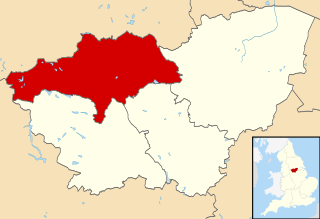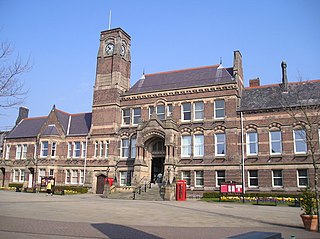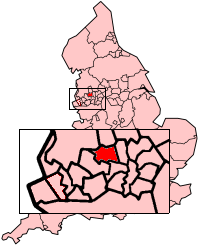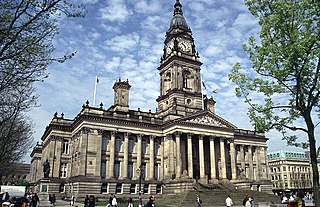
The Metropolitan Borough of Wigan is a metropolitan borough of Greater Manchester, in North West England. It is named after its largest component town and former county borough, Wigan and includes the towns and villages of Leigh, part of Ashton-in-Makerfield, Ince-in-Makerfield, Hindley, Orrell, Standish, Atherton, Tyldesley, Golborne, Lowton, Billinge, Astley, Haigh and Aspull. The borough was formed in 1974 and is an amalgamation of several former local government districts and parishes. The borough has three civil parishes and lies directly to the west of the City of Salford and southwest of the Metropolitan Borough of Bolton. The local authority is Wigan Metropolitan Borough Council.

The Metropolitan Borough of Barnsley is a metropolitan borough of South Yorkshire, England; its main town is Barnsley.

The Metropolitan Borough of St Helens is a metropolitan borough of Merseyside, in North West England. It is named after its largest town St Helens, and covers an area which includes the settlements of Sutton, St Helens, Earlestown, Rainhill, Eccleston, Clock Face, Haydock, Billinge, Rainford and Newton-le-Willows.

Leeds City Council is the local authority of the City of Leeds in West Yorkshire, England. It is a metropolitan district council, one of five in West Yorkshire and one of 36 in the metropolitan counties of England, and provides the majority of local government services in Leeds. Since 1 April 2014 it has been a constituent council of the West Yorkshire Combined Authority.

Beddington and Wallington was, from 1915 to 1965, a local government district in north east Surrey, England. It formed part of the London suburbs, lying within the Metropolitan Police District and the London Passenger Transport Area. In 1965 it was abolished on the creation of Greater London.

The 1998 Bolton Metropolitan Borough Council election took place on 7 May 1998 to elect members of Bolton Metropolitan Borough Council in Greater Manchester, England. One third of the council was up for election and the Labour party kept overall control of the council.

The first elections to the new local authorities established by the Local Government Act 1972 in England and Wales and the new Northern Ireland district councils created by the Local Government Act 1972 took place in 1973. Elections to the existing Greater London Council also took place.

Nottinghamshire County Council is the upper-tier local authority for the non-metropolitan county of Nottinghamshire in England. It consists of 66 county councillors, elected from 56 electoral divisions every four years. The most recent election was held in 2017.

Elections to Bolton Metropolitan Borough Council was held on 6 May 2010, on the same day as the General Election which led to a much higher turnout than in recent years. One third of the council was up for election and the council stayed under no overall control.
Milton Keynes is a unitary authority in Buckinghamshire, England. Until 1 April 1997 it was a non-metropolitan district.
Elections to Sheffield Council were held on 10 May 1973.

The 1973 Wigan Council elections for the First Wigan Metropolitan Borough Council were held on 10 May 1973, with the entirety of the 72 seat council - three seats for each of the 24 wards - up for vote. It was the first council election as the newly formed metropolitan borough under a new constitution. The Local Government Act 1972 stipulated that the elected members were to shadow and eventually take over from the predecessor corporation on 1 April 1974. The order in which the councillors were elected dictated their term serving, with third-place candidates serving two years and up for re-election in 1975, second-placed three years expiring in 1976 and 1st-placed five years until 1978.
The first elections to the newly created Leeds City Council were held on 10 May 1973, with the entirety of the 96 seat council - three seats for each of the 32 wards - up for vote. The Local Government Act 1972 stipulated that the elected members were to shadow and eventually take over from the predecessor corporation on 1 April 1974. The order in which the councillors were elected dictated their term serving, with third-place candidates serving two years and up for re-election in 1975, second-placed three years expiring in 1976 and 1st-placed five years until 1978.
The first elections to the newly created Solihull Metropolitan Borough Council were held on Thursday, 10 May 1973, with the entirety of the 51 seat council - three seats for each of the 17 wards - up for vote. The Local Government Act 1972 stipulated that the elected members were to shadow and eventually take over from the predecessor corporation on 1 April 1974. The order in which the councillors were elected dictated their term serving, with third-place candidates serving two years and up for re-election in 1975, second-placed three years expiring in 1976 and 1st-placed five years until 1978.
The first elections to the newly created City of Bradford Metropolitan District Council were held on 10 May 1973, with the entirety of the 93 seat council - three seats for each of the 31 wards - up for vote. The Local Government Act 1972 stipulated that the elected members were to shadow and eventually take over from the predecessor corporation on 1 April 1974. The order in which the councillors were elected dictated their term serving, with third-place candidates serving two years and up for re-election in 1975, second-placed three years expiring in 1976 and 1st-placed five years until 1978.

Elections to Bolton Metropolitan Borough Council were held on 3 May 1980. The whole council was up for election, with boundary changes since the last election in 1979. The Labour Party gained control of the Council from the Conservatives, who had previously been in control almost continuously since 1966. The overall number of councillors was reduced to 60 compared with 69 in 1979. The Labour Party made a net gain of 6 seats and the Conservatives a net loss of 15. Following this election, Cllr Robert Howarth of Central Ward was elected Leader of the Council and was to remain Leader until 2004, one of the longest serving Council leaders in the UK.

The 1984 Bolton Metropolitan Borough Council election took place on 3 May 1984 to elect members of Bolton Metropolitan Borough Council in Greater Manchester, England. One third of the council was up for election and the Labour party kept overall control of the council

Elections to Bolton Metropolitan Borough Council were held on in May 1976. The Conservatives retained control of the Council.
The first elections to the newly created Barnsley Metropolitan Borough Council were held on 10 May 1973, with the entirety of the 60 seat council - three seats for each of the 20 wards - up for vote. The Local Government Act 1972 stipulated that the elected members were to shadow and eventually take over from the predecessor corporation on 1 April 1974. The order in which the councillors were elected dictated their term serving, with third-place candidates serving two years and up for re-election in 1975, second-placed three years expiring in 1976 and 1st-placed five years until 1978.
The first elections to the newly created Calderdale Metropolitan Borough Council were held on 10 May 1973, with the entirety of the 51 seat council — three seats for each of the 17 wards — up for vote. The Local Government Act 1972 stipulated that the elected members were to shadow and eventually take over from the predecessor corporation on 1 April 1974. The order in which the councillors were elected dictated their term serving, with third-place candidates serving two years and up for re-election in 1975, second-placed three years expiring in 1976 and 1st-placed five years until 1978.












